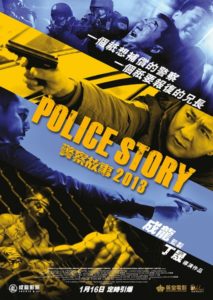Police Story 2013
警察故事2013
China/Hong Kong, 2013, colour, 2.35:1, 3-D (China only), 109 mins.
Director: Ding Sheng 丁晟.
Rating: 5/10.
Forced revival of the Cheng Long [Jackie Chan] franchise barely scrapes through on any level.
Beijing, the present day, late Dec. Captain Zhong Wen (Cheng Long), a policeman for 20 years, goes to Bar Street to meet his daughter, hospital intern Miaomiao (Jing Tian), whom he hasn’t seen for six months. The two have been estranged ever since the death of her mother/his wife five years ago, which Miaomiao always partly blamed on his devotion to work. She has booked a private room in Wu Club, whose owner, Wu Jiang (Liu Ye), is celebrating its third anniversary with a hot-ticket party of the city’s demi-monde. Aggressively made up in clubbing gear, Miaomiao shocks the conservative Zhong Wen by announcing that Wu Jiang is her boyfriend. After a disturbance involving a  suicidal man (Fan Lei), Zhong Wen loses consciousness and wakes up to find himself tied to a chair in Wu Jiang’s office. Wu Jiang has sealed off the whole club – which is built like a fortress – and is holding everyone, including Miaomiao, hostage for RMB80-90 million. To understand why he’s been tricked into coming this evening, Zhong Wen tries to remember if there was a past case for which Wu Jiang is seeking revenge on him. Wu Jiang then demands to have brought to him a man called Wei Xiaofu (Zhou Xiao’ou), who is serving a prison sentence for an attempted robbery at a pharmacy five years ago in which a young woman died. Gradually, Zhong Wen realises that Wu Jiang has assembled everyone who was present at the pharmacy incident that night.
suicidal man (Fan Lei), Zhong Wen loses consciousness and wakes up to find himself tied to a chair in Wu Jiang’s office. Wu Jiang has sealed off the whole club – which is built like a fortress – and is holding everyone, including Miaomiao, hostage for RMB80-90 million. To understand why he’s been tricked into coming this evening, Zhong Wen tries to remember if there was a past case for which Wu Jiang is seeking revenge on him. Wu Jiang then demands to have brought to him a man called Wei Xiaofu (Zhou Xiao’ou), who is serving a prison sentence for an attempted robbery at a pharmacy five years ago in which a young woman died. Gradually, Zhong Wen realises that Wu Jiang has assembled everyone who was present at the pharmacy incident that night.
REVIEW
After trying a decade ago to reinvent his original series with the Generation-X-ish New Police Story 新警察故事 (2004), directed by Chen Musheng 陈木胜 [Benny Chan], Cheng Long 成龙 [Jackie Chan] has another try with Police Story 2013 警察故事2013, this time under Mainland director Ding Sheng 丁晟 who previously steered him okay through Little Big Soldier 大兵小将 (2010). Set in China and, like New Police Story, unrelated to the original quartet (1985-96), this one finds Cheng, now 59 but only looking it in close-ups, even more unsure of how to position the film: as a further move into more character-based drama or still preserving elements of his cheeky-chappie routine? It’s a conundrum which has been plaguing Cheng’s career for the past decade – with largely iffy results, apart from the kids’-orientated CZ12 十二生肖 (2012) – and which is not resolved by Police Story 2013. This is one franchise that would have better been left dead: the uncomfortable truth is that one of the main impediments to the movie, as in New Police Story, is Cheng himself.
Apart from its first two instalments, the Police Story series has really only been bound together by its title and Cheng’s presence as an increasingly super super-cop. New Police Story took the actor, then 50, into darker areas as a burned-out, alcoholic policeman; PS2013 initially goes even further, opening with his character apparently blowing his brains out. As the story rewinds to its start, Cheng plays a veteran Beijing policeman who’s all but estranged from his daughter and is summoned to a meeting with her at a demi-mondish nightclub where she rebelliously announces she’s hooked up with its louche owner. The opening section is largely designed to show how out of place Cheng’s police officer is in this modern, clubby environment, as well as to build character before the plot actually starts. But there’s a distinct lack of real drama until, 20 minutes in, Cheng’s cop wakes up tied to a chair and finds himself a pawn in an elaborate hostage scenario by the club’s owner.
As the plot slowly reveals its point and backstory – largely in a big flashback 80 minutes in that would have better trailed throughout the film – the tempo is artificially jazzed up by brief action flashbacks (in which Cheng’s cop recalls past cases) and even by the cheating device of what-if sequences. It’s as if the film doesn’t have the self-confidence to be just a claustrophobic hostage drama, 90% set within a shadowy-lit nightclub, simply because Cheng is the star and Cheng’s audience want Cheng-like action. Though the script is far from perfect in the first place – the villain’s elaborate scheme is hardly justified by what emerges – PS2013 could have been a gripping psychological game with a few rewrites, a strong cast of actors, and not being forced to become a Cheng Long movie.
With The Underdog Knight 硬汉 (2008) and He-Man 硬汉2 奉陪到底 (2011), both starring Mainland actor Liu Ye 刘烨, Ding has shown he can make quirky, blackly comic action movies that are as much about character as fisticuffs. That talent manifests itself occasionally in PS2013, but not consistently enough to carry the film. Here cast as a fairly standard villain, Liu brings a chatty flavour to the character that makes him more than just a control-freak psycho; but there’s no real acting chemistry between him and Cheng, much as the latter tries to assume a serious demeanour. Mainland actress Jing Tian 景甜, who’s previously shown both acting (The Warring States 战国, 2010) and action (Special ID 特殊身份, 2013) smarts, has little to do except turn girly after a strong start. The rest of the cast are largely distraught hostages, apart from Zhou Xiao’ou 周晓欧 as a sympathetic criminal and Yu Rongguang 于荣光 in a cameo as a tough SWAT officer.
The action, staged by JC Stunt Team’s He Jun 何钧, is more slug-it-out than elaborately choreographed, and largely staged in the semi-darkness of the club, with its neon lighting and metal-heavy construction. In fact, it’s quite a relief whenever the action shifts briefly outside, where Ding Sheng’s regular d.p. Ding Yu 丁豫 (unrelated) creates some striking widescreen images. The director himself pops up in an early cameo as a taxi driver.
CREDITS
Presented by Wanda Media (CN), Starlit HK International Media (HK). Produced by Wanda Media (CN), Starlit HK International Media (HK), Ministry of Public Security Publicity Bureau (CN), Beijing Municipal Public Security Bureau (CN).
Script: Ding Sheng. Photography: Ding Yu. Editing: Ding Sheng. Music: Lao Zai [Loudboy]. Art direction: Feng Ligang. Styling: Wang Yi. Sound: Chen Chen. Action: Han Gunhua. Action choreography: He Jun, JC Stunt Team. Car action: Luo Lixian [Bruce Law], Luo Yimin [Norman Law]. Visual effects: Huang Jianming, Wang Shang (Daysview Digital Image). 3-D visual effects: Chuck Comisky.
Cast: Cheng Long [Jackie Chan] (Zhong Wen, police captain), Liu Ye (Wu Jiang), Jing Tian (Miaomiao, Zhong Wen’s daughter), Yin Tao (Lanlan, nightclub manager), Na Wei (Na Na, pharmacy manager), Liu Yiwei (Niu, businessman), Liu Hailong (Pichon, Filipino henchman), Zhou Xiao’ou (Wei Xiaofu), Yu Rongguang (Wu, SWAT officer), Wu Yue (Yue/White Hair), Liu Peiqi (Zhang Guomin, police chief), Zha Ka (Bin, Thai henchman), Cai Lu (Kun, barman), Fu Hai (Taozi, main henchman), Zou Yizheng (worker), Tong Chenjie (Zhu Nan, TV presenter), Gulnazar (Xiaowei, Wu Jiang’s younger sister), Zhang Lei (Quanzi, Zhu Nan’s cameraman), Shi Lijia (Duan Mu) Tang Jiaqi (Da Xiang), Li Shipeng (DJ), Zhou Rong (pole dancer), Wang Haixiang (waiter), Zhang Ze (waitress), Li Jiaxuan, Xu Li, Huang Di, He Xiang, Huang Xiaoyu (hostages), Jiao Jiao (bar guest), Li Zixuan (lap dancer), Dai Wenjie (waitress), Randy Liu (Bar Street manager), Fan Lei (suicidal man), Luo Lixian [Bruce Law] (kidnap car driver), Song Zhuoyuan (kidnapped girl), Tu Shengcheng (Guoqiang), Huang Yonggang (Chao), Chen Yuemo (Chen, policeman), Zhou Tie (Tie, policeman), Li Haibin (Hai, policeman), Xu Yang (Xu, policeman), Ding Sheng (taxi driver), Yang Guangjun (bystander), Feng Liang (Bar Street policeman), Gan Di (reporter), Lan Ruihai (cameraman), Yu Yankai (cage-fighting club manager), Lanre Rabiu (cage-fighting club referee), Long Wu (muscular cage-fighter), Wang Haiqi, Andy Nguyen, Max Huang, Alexandre Bailly, Vincent Soberano, Olaitan Rasheed Odutayo, Zacarias Rene Frank Alberto (cage-fighters), He Jing, Wang Bin, Zhang Danzi.
Release: China, 24 Dec 2013; Hong Kong, 16 Jan 2014.
(Review originally published on Film Business Asia, 30 Jan 2014.)
